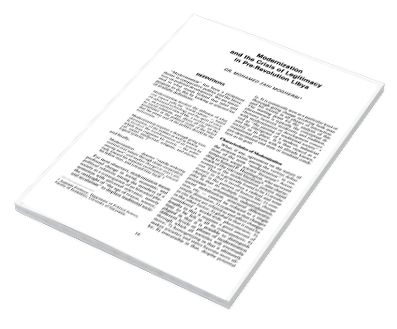Modernization and the Crisis of Legitimacy in Pre-Revolution Libya
DOI:
https://doi.org/10.37376/deb.v17i2.1933الملخص
It is commonly seen as a particular kind of thorough-going change involving both man "Modernization” has been a prominent and hissociety in all phases of inte theme in comparative politics and the litera- The starting point for the analysis of this ture on political development. We are intere- phenomenon is typically the conceptual di sted in what stands behind that label and chotomy between modernity and tradition, propose to do this by looking at selected list with modernization or development concei of availabe definitions: ved as “the passing of traditional society” and the emergence of a modern, industrial Modernization involves the diffusion of what society in its place. It is thus viewed as a one expert calls the "world culture" – based transitional process with an already known, on advanced technology and the spirit of scien- pre-determined end state or resultant condi ce, on a rational view of life, a secular approach tion as its goal. to social relations, and, above all else, on the acceptance in the political realm of the belief Characteristics of Modernization that the prime unit of the politics should be the nationstate." What, if any, agreement on the nature of
the process exists among the various defini Modernization requires a thorough going tran- tions of the term "modernization” in con sformation, of the politics as well as society ... temporary social science literature? Accor It involves the transformation of all system by ding to Samuel P. Huntington, who surveyed which man organizes his society — the politi much of the relevant literatures, nine charac cal, social, intellectual, religious, and psycho teristics of the modernization process stand logical systems. out. Thus it is generally found to be 1) revolu and finally, tionary in that it involves a radical and total change in the pattern of human life; 2) com Modernization ... denotes “rapidly widening plex in that its multiple component change control over nature through closer cooperation processes —- urbanization, industrialization, among men” and implies changes in man's atti- social mobilization, structural differentia tude toward his material environment, toward tion, etc. — cannot be reduced to a single his fellow man, and toward time itself. simple dimension; 3) systemic in that changes in one factor are related to and affect changes For most observers, modernization means in the other factor; 4) global in that it must be profound change in social, economic, and considered a world-wide phenomenon; 5) political relations among the members of a lengthy in that it requires a great amount of society as a consequence of an historical phe time to be felt in all its consequences; 6) nomenon with universal relevance, namely
phased in that it is possible to distinguish the onslaught of “the age of reason, science, different levels or phases of modernization and secularism” to displace traditional socie through which all societies will eventually move; 7) homogenizing in that it ultimately * Assistant Professor, Department of Political Science, makes societies and states become more ali Faculty of Economics, University of Garyounis. ke; 8) irreversible in that, despite potential
التنزيلات

التنزيلات
منشور
كيفية الاقتباس
إصدار
القسم
الرخصة
الحقوق الفكرية (c) 2022 دراسات في الاقتصاد والتجارة

هذا العمل مرخص بموجب Creative Commons Attribution-NonCommercial-NoDerivatives 4.0 International License.







